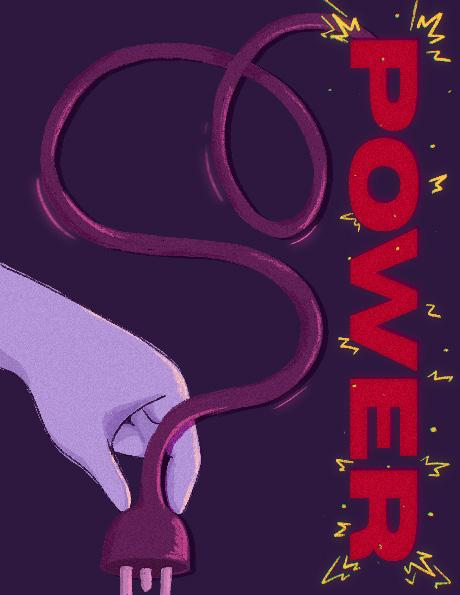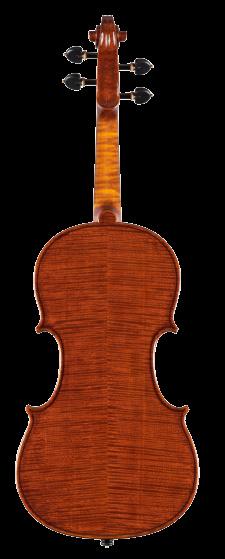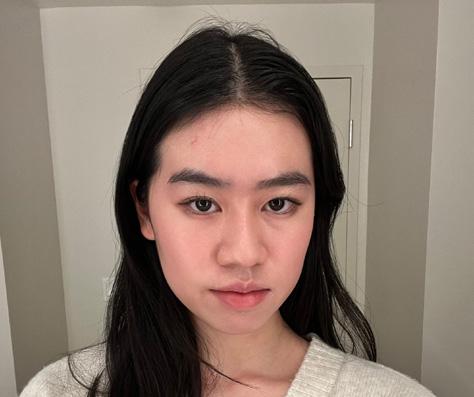

Dear readers,
The idea of wielding power is defned differently to different people. Likewise, when someone thinks of the word “power,” the questions that pop up inside of their head vary depending on the context behind the word. At its core, what does it mean to be powerful? What does it mean to feel empowered? Are these two concepts one and the same? In our lives, who holds power over us? This can be answered at a societal level, from literal gov ernment leaders to the laws held over us wherever we are. It can be answered at a community level, such as when one considers the power dy namics within their own re lationships. To me, the most notable con siderations of power come from self-re fection; power stems from the idea of how one empowers their own life through their own free will and actions, in spite of inter ventions from the outside pressures and forces that wish to hinder them.
Power comes from a plethora of different roots, from overt displays of political activism to quiet acts of power that bolster self-confdence and give us the conviction to assert ourselves in our own space. As I’m sure is common in the Asian, Pacifc Island er, and Desi American (APIDA) community, I was raised with the idea of silently obeying. In the eyes of those from generations before, especially amongst many who were immigrants, the goal was silent suc
cess; it was to not draw attention to ourselves. I was scared to “rock the boat,” so to speak, and thus kept my turmoil and anger on the tip of my tongue. My own journey toward self-empower ment came from a lot of self-refection, and the unlearning of passive values. It also came from reconnecting with my friends, my family, and my community, in an effort to better both myself and my relationships. In a nutshell, I feel empowered when I am confdent, and when I surround myself with those who care about me and push me to self-advocate.
Power does not have to refer to mere physical force, nor does it have to refer to an unques tionable authority. Part of power comes from reclamation. It comes from solidi fying our presence and our cultural norms as APIDA students in a land scape that previ ously deprived us of power.
All in all, the idea of having power brings up a diversity of frst reactions, thoughts, and meaningful refections, all of which we seek to explore in this issue. We invite you to join us, and to read about how we at Pacifc Ties view or are inspired by the power we encounter in our own lives.
Sincerely, Abita Venkatesh Editor-in-Chief 2021-2022
 PHOTO BY JOSEPHINE YII
WRITTEN BY VARSHA RAVI EDITED BY CHELSEA TRAN AND VANSHITA GUPTA DESIGNED BY CHARLOTTE CHUI
PHOTO BY JOSEPHINE YII
WRITTEN BY VARSHA RAVI EDITED BY CHELSEA TRAN AND VANSHITA GUPTA DESIGNED BY CHARLOTTE CHUI
There’s
a meme I’ve seen go around once or twice. It varies in format, but a favorite iteration of mine is an image of Willem Dafoe in a hoodie rather incongruously posed with the text, “I just need to get through the next 52 weeks.”
We derive a kind of power from that, I think. There’s validation to be found in the sense that we are slogging through life at breakneck speed, moving seamlessly from one task to the next—the sense that we are doing all we can, whenever we can. There’s only so much time, after all.
But it’s a fimsy and self-fagellating power, a hollow sort of strength that leaves me staring into empty space as I carry over countless tasks to the next day of my Notion to-do list, as I realize that I am burning myself away, little by little, just


I work, therefore I am. Leisure, it seems, is marked out in a danger zone in my mind—wallow in self-awareness too long and risk the terrible fate of understanding just how tired I am, just how powerless my hunger to assert my own strength makes me.
In high school, I was voted Biggest Workaholic, a superlative to which I both strived and felt unftting for. I remember
my initial surprise, the way I thought, Me? Really? Because despite my work ethic, I didn’t really think of myself as a hard worker. I still don’t. A worker, maybe, but not a hard one, not one deserving of any admiration.
Because we all worked hard. We’re all working.
SPRING 2022 | VOLUME 23
ILLUSTRATION
And amidst productivity hacks, new strategies for decreasing the span of each study break, Day in the Life videos that seem to begin at the crack of dawn and sail through the day without interruption or — God forbid — laziness to an early bedtime, balance can feel like a chore. Even worse, it can feel like another objective to add onto to the Notion to-do list, as if self-
care is something so easily defned; we quantify it so that we can sideline it and transform an activity as ambiguous and unique as lifelong self-refection and mindfulness into a cheery little checkbox to stave off the ever-present bogeyman of burnout.
But what happens after the bogeyman catches up with us? What happens if it never does? Where are we going, and where is this societal drive for ‘more’ and ‘now’ and ‘before it’s too late’ taking us?

Art tells me about the signifcance of the present in defance of the future. It tells me that life can be beautiful when I deign to live it, instead of simply moving through it. That power, if it truly exists, is far more likely to reside in peace than it is in overwork.
It’s an admirable notion, a lovely one. And in my dreams, I brush one hand against the glass surface between us as I disappear into my carefully set plans for the next fve years.

As in the song “Runaway” by Aurora — I am looking for a soft place to fall. I am looking for softness. But I fear that when I fnd it—if I even recognize it for its gentle hands and not the simple absence of a stimulus — I will not know how to fall. I fear that I have forgotten — and I fear for a world in which we’re taught never how.
PACIFIC TIES NEWSMAGAZINE 4 ILLUSTRATION BY AMBER LEE
BY AMBER PHUNG EDITED BY SHUNE KAWAOTO AND CHARLOTTE CHUI DESIGN BY CHELSEA TRAN LAYOUT BY VANSHITA GUPTA

English poet Alfred Lord Tennyson once said, “Tis better to have loved and lost than never to have loved at all.” To many, these words ring true: it is widely believed that love – in both platonic and romantic forms – is an empowering force with the ability to transform one’s life for the better. Many peo ple search their whole lives for “true love,” whether it is that perfect best friend to have crazy nights out with but also share deep, emotional truths or a dreamy Prince Charm ing that sweeps you off your feet. Yet these same people enter and stay in relationships that reinforce toxic emotional dynamics and a perpetual power struggle.
The sad reality is that the desire to have power in a relationship cannot coexist with love, neither friendly or romantic. Power in and of itself is founded upon a lack of compassion and empathy, as the individual pursuing it becomes willing to sacrifce their morals to maintain control.
According to González-Forero, whether you are aware of it or not, we as humans are evolutionarily1 wired to chase power as a result of natural selection: the development and survival of early civilization relied solely on the creation of dominance hierarchies, which encouraged our species to partake in ceaseless power conficts.
1 González-Forero, M., & Gavrilets, S. (2013, Nov 28). Evolution of Manipulated Behavior. Chicago Journals. Retrieved April 10, 2022, from http://volweb2.utk. edu/~gavrila/papers/manipulation.pdf
SPRING 2022 | VOLUME 25
This isn’t to say that wanting and exuding power is a bad thing: working hard to gain power in the workplace or classroom is admirable and crucial to success, and the foundations of our society would collapse without a clear power order. However, power in personal relation ships can be and is often used to manipulate others.

To illustrate the situation, consider a friendship built on a persistent power struggle: two friends compete to be better than the other through grades, physical appear ance and extracurricular participation. Whenever some thing good happens to one, the other feels as though they lose their power, and consequently puts their friend down. The perpetual cycle of needing to one-up someone else in a friendship reinforces the standard that one needs to prove themselves to others and that this is only possible by gaining power over another.
In the heat of the moment, doing better than some one else feels rewarding, but in reality, friendship is supposed to encourage both parties to bring out the best version of themselves by supporting one other. For example, if someone got an A on a test while their friend got a C, the previous individual wouldn’t make their friend feel worse or less than because of their low er grade. Instead, in a healthy friendship, they would acknowledge the fact that not everything is a race for superiority.
PACIFIC TIES NEWSMAGAZINE 6
Subconsciously, we all desire to be the cooler, pretti er, smarter and more charismatic individual in any dy namic – between friends, signifcant others and even a crowd of strangers. As defned by the Scientifc American Blog, humans themselves are psychologi cally engineered to fall prey to the illusory superiority bias2, where any human individual believes that they alone are better, more empathetic, caring, emotion ally deep and just superior to others, no matter how modest they claim to be.
Thus, when this superiority bias is challenged even in the slightest, it is as though all the power we once treasured is eradicated, and our brain immediately makes up excuses to protect our lack of it. For in stance, when someone you previously thought to be lazy and less intelligent than you does better than you on a fnal exam, your instinctive thought may be, “Oh, they cheated,” or “The teacher must have made a mistake,” instead of considering that you aren’t actually as superior as you think you are.
This type of thinking can breed toxicity within even the strongest bonds. Constant comparison and power confict, either direct or indirect, only leads to a lack of love. Friendships and romantic relationships cannot fourish under power’s dictatorship. To overcome this, we must be able to both acknowledge power’s role in our lives and separate it from our relationships. Al though love can empower us, the existence of power alongside it subdues love’s healing and transforma tive abilities.
 2 The Superiority Illusion: Where Everyone Is Above Average. (2013, April 1). Scientifc American Blogs. Retrieved April 10, 2022, from https://blogs.scientifcamerican.com/scicurious-brain/the-superior ity-illusion-where-everyone-is-above-average/
2 The Superiority Illusion: Where Everyone Is Above Average. (2013, April 1). Scientifc American Blogs. Retrieved April 10, 2022, from https://blogs.scientifcamerican.com/scicurious-brain/the-superior ity-illusion-where-everyone-is-above-average/
SPRING 2022 | VOLUME 27
WRITTEN BY LISA RAMOS
EDITED BY CHELSEA TRAN AND CHARLOTTE CHUI DESIGN BY AMBER LEE LAYOUT BY VANSHITA GUPTA
[Writer’s Note] Loosely inspired by the story of Joan of Arc, I wanted to write a poem from a woman's perspective of a long, enduring battle with a victorious af termath. Rarely does one see war stories from a woman's perspective, especially from those who lead the frontlines themselves. With the theme of power, I hoped to subvert the idea fof power being conceptualized as one’s strength and endur ance as solely a masculine trope. In addition, I wished to encapsulate how one’s determination and leadership are demonstrative of how powerful one truly is.

weary are her limbs, now fragile as spider-woven string having fought endlessly to express a cause her heart sings. the road to triumph left scattered soldiers painted and smeared scarlet red but the blazing fre in her eyes hints at a battle not over, not just yet. in midst of cannons engulfng skies with charcoal-hazed gray her booming roar permeates the smoke with her, front of the fray. lifting her blade in newfound strength, she leads the charge as fellows and foes watch this unstoppable force trembling, in awe. nimble but ferce she twirls around these men with elegance, femininity is her beloved power not forsaken to conform with the rest. enduring cuts from the opposition in return, she deals her sword’s slash, the end of her enemies marking a new beginning when only she is the one who still stands.
now uncontested in her remarkable prowess she grins with rouge-painted lips — “victory at last!”
PACIFIC TIES NEWSMAGAZINE 8















SPRING 2022 | VOLUME 29


















PACIFIC TIES NEWSMAGAZINE 11



















SPRING 2022 | VOLUME 211
WRITTEN BY ANISHA MENATH EDITED BY EMMA ONG AND VANSHITA GUPTA DESIGNED BY CHARLOTTE CHUI
When I was called a tongue-twisted, timid Asian girl, they did not know they were insulting those who built the lines on the palms of my hand and the strands of my hair.
Like tributaries connecting into one stream, I share the lines of my ancestors and the turmeric that stained them.
Because under the nail, you will always eating your mother’s chicken curry and realize that you can never wash it away.
And your hair is always oiled back to show your face. You can never wash it enough times to get the smell of coconut out.
But who wants to see my face if it’s timid and scared, even though it’s the coconut oil that gave my grandmother the strength resting at the center of her head, bearer of braids?
There is always a “we” in “me”; I am not alone at any point because my

grandmother’s hair was just as tangled and messy as mine.
I may be tongue-twisted and shy but that does not mean I haven’t tried.
I think so much that my head swells and expands, I write so much that my hands throb from the proposition of adding more words to the paper.
My voice is hidden within this box of who I am I meant to be, why speak up if I can play the part they want me to play?
Turmeric in my hands and oil in my hair,
I drop ballots into bins for a better future, I march at protests to end violence, I do what is asked of me and more because just being good is not enough.
The power lies within the turmeric and oil that everyone wanted so much that they came and stole and traded it, but not today, because today, it belongs to me.
PACIFIC TIES NEWSMAGAZINE 12
WRITTEN BY CHARLOTTE
EDITED BY LISA RAMOS DESIGNED BY CHARLOTTE
seeing my culture & ethnic features represented by Simone Ashley & Charithra Chandran in Bridgerton’s second season
Varsha Ravi second-year neuroscience major
using my voice for my community
Kara Chu
frst-year applied linguistics major seeing Asian actors as main cast members of flm/TV in a non-stereotypical way

Morgan Chu
third-year sociology major
when I get to discuss what I am passionate about
Abita Venkatesh fourth-year biology major
seeing my cultural experiences refected experiences of Christine King second-year psychology
having my cultures be accurately & appropriately portrayed to others Shune Kawaoto frst-year environmental science major
being able to create something new Sophie Vansomphone frst-year pre-human biology & society major
SPRING 2022 | VOLUME 213
CHARLOTTE CHUI
RAMOS AND VANSHITA GUPTA CHARLOTTE CHUI
ILLUSTRATIONS BY AMBER LEE
pursuing a music career & using my full name as my artist name

Manisha Wanniappa second-year global studies major cultural refected in the others
psychology major

getting six or more hours of sleep

Louise Lin third-year physiological science major
fully embracing cultural traditions & sharing it with others
Anisha Menath frst-year sociology & international environmental studies major seeing South Asian women like me have thriving businesses that incorporate their unique identities & cultures
Vanshita Gupta second-year molecular, cell, & developmental biology major
new major

a professional outft & a good hairday
Lynette Caballero third-year English major
participating in Vietnamese traditions & reclaiming my identity
Kate Ly third-year sociology major

PACIFIC TIES NEWSMAGAZINE 14
WRITTEN BY ABITA VENKATESH EDITED BY LYNETTE CABALLERO AND CHARLOTTE CHUI DESIGNED BY CHELSEA TRAN
LAYOUT BY ABITA VENKATESH
You
were such a sweet little girl.
As an Indian woman, I am all too used to hearing this sentence. But I am not the only one.
Praised for always listening to one’s parents, staying quiet unless spoken to and keeping in touch with cultural roots by learning our mother tongue — these are the values that generations of Asian parents teach their children in their youthful years, when one still requires parental guidance in order to live in the everyday world.
These are also the values that a multitude of adult women, especially Asian women, are forced to encompass and emanate for years. They stay and stem from years of living in a patriarchal, racialized world — a world that fnely yet skillfully strips us of power.
There is a common stereotype rooted within our society that says Asian women are meek, submissive
and less likely to be seen as a leader. Based on data from the United States Equal Employment Opportunity Commission, amongst the fve largest tech companies in the U.S., Asian women are the least represented in executive roles when compared to white men, white women and Asian men. This perception has a wide variety of sources, and the intersectionality of race and gender is integral to its deep-seated roots in our collective mindspace. While all women face sexism and negative stereotyping, the details of the stereotypes vary between women of different racial and ethnic lines. In the sphere of career advancement and leadership, the power of Asian women is stripped down and buried as part of many systemic forces at play.
As a South Asian woman, I am constantly subsumed by the expectation of docility and submissiveness. I was expected to stay out of the room when the men cluster together at family gatherings within the home. I was expected to hold my tongue from opinions on subjects deemed not ft for women’s ears. I was expected to help out with the communal cooking with all of the women in the kitchen, regardless of my own opinions and desires.
When one’s own autonomy is so easily faced with
When one’s own autonomy is so easily faced with backlash, the idea of empowerment becomes more of a chore and less of a prideful moment of self-advocacy.
Until society as a whole advances beyond the mindset of the permissive Asian woman, there will always be a jolt of surprise whenever someone of my background breaks the status quo by speaking up.
SPRING 2022 | VOLUME 215
backlash, the idea of empowerment becomes more of a chore and less of a prideful moment of self-advocacy.
I notice the subtle differences in how certain men of my background and in my family view my role as compared to my male cousins. We are both asked — under the guise of men who consider themselves to be very modern — about our grades, our career goals, our education. However, only the women are asked, relentlessly, about our marriage prospects and plans from the time we are in our early twenties. Only the women are expected not only to have, but to desire, children in our future. Only the women are expected to create and maintain a lovely, welcoming home ripe for the future in-laws and husband’s friends, somehow complete with a home-cooked meal and spotless house after a tiring workday outside of the house.
The farce is obvious, and not least of all cruel. Some people’s notions of feminism today include the universal truths that women are just as capable, free and able as men to achieve educational advancement and career progression. However, their version of feminism also somehow fails to mention that the consistent labor of “traditional” female contributions to society, such as childcare and homemaking, should not also be held by the woman herself. The “power” given to women in the
U.S. today to choose their own path is thinly veiled and quite interwoven with the extra load, the extra labor for which we are not compensated or appreciated.
In the academic and workplace setting, the quiet burden placed upon women of my background is more subtle, yet just as interwoven into the general culture of the space. It is assumed that I will take on the extra workload in group projects without a complaint. It is expected that I not argue back when a number of my male peers disagree with my points or ideas, and I am seen as combative when I do not conform. It is expected that I saddle onto these unfortunate truths without hindrance.
School is my and many others’ gateway into how we will act in our professional felds. Those never allowed to be group leaders, never allowed to allocate roles and never allowed to speak their mind without fear of ridicule or dismissal are less likely to bring confdence and leadership values into the workforce. Those who, in their house, are expected to never speak up, and are seen as boisterous or bossy when they are merely opinionated, will be less likely to carry confdence outside of the home.
The idea of an outspoken, extroverted woman may be too bizarre a concept for even some contemporary minds in my culture to wrap their head around. It is unfamiliar and foreign; it is the idea of a woman scarcely thought of as positive until recent years.
I simply do not want to be known as a sweet little girl anymore, and the same goes for many of my peers. Until society as a whole advances beyond the mindset of the permissive Asian woman, there will always be a jolt of surprise whenever someone of my background breaks the status quo by speaking up.

PACIFIC TIES NEWSMAGAZINE 16


 WRITTEN BY CHELSEA TRAN EDITED BY SHUNE KAWAOTO AND VANSHITA GUPTA LAYOUT AND DESIGN BY CHELSEA TRAN
PHOTO CREDIT: CHELSEA TRAN
WRITTEN BY CHELSEA TRAN EDITED BY SHUNE KAWAOTO AND VANSHITA GUPTA LAYOUT AND DESIGN BY CHELSEA TRAN
PHOTO CREDIT: CHELSEA TRAN
CHOICES
SPRING 2022 | VOLUME 217
Astethoscope,
a book and a calculator. These are three things that would seemingly chart the trajectory of the rest of my life. I never had any power over it.

I was once taught that the power over choice is what makes us human. We have the ability to choose what we do, rather than be solely driven by our instincts. What do we do, then, when the power of choice is taken from us? As the frst-born daughter in a Vietnamese-American family, I never felt like I had a choice when it came to choosing a career.

The stethoscope, book and calculator were all items I picked up during my one-year old celebration party. My family practiced this tradition where parents would place objects representing a career onto a big giant red plate and have their children pick three of those objects once we turned one-year-old. This is known as thôi nôi in Vietnamese culture. The stethoscope is clearly symbolic for a medical career, whereas the book represented scholarly aspirations and the calculator represented a business or accounting profession.
I have lived in the shadow of this “choice” I made when I was only a year old. My family has always expected me to become either a doctor or an accountant (but mostly doctor), holding onto this particular image of a smart and successful woman for the past twenty years. Since I’m the eldest, I have carried this image on my back to show my sibling it’s not a weight too great to bear. To show my sibling that they, too, can carry this weight. That they, too, can chase big dreams and catch them. Even now, as a college student, I still see myself following
PACIFIC TIES NEWSMAGAZINE 18
 photo by cottonbro on Pexe
photo by cottonbro on Pexe
SPRING 2022 | VOLUME 219
l
written by Christine King edited by Lisa Ramos & Vanshita Gupta design and layout by Chelsea Tran
There are three main points of view used in writing: third person, second person, and frst person. Each conveys a different sense of distance between the narrator and the reader; each gives a different feeling of where the reader belongs within the context of the story. The following examples illustrate these distinctions.
Third-person point of view: he/she/they
She is sitting down. He is turning the page. They are making their way through this sentence, catching their breath at the comma, reaching the end where it trails to a close.
Second-person point of view: you
You are a child young enough to dream, old enough to dream quietly. You are tucking your memo ries and secrets into notebooks: for my eyes only. You are writing a note to a person who will not write back; you toss it into the future, hoping it lands in the hands of someone who says, I still remember you now that I’m older. I promise.
First-person point of view: I
I am unfolding a note I wrote to myself when I was young. I am closing my eyes and scraping through memories, sticking them together in any way that makes sense. I am writing down a story, this tale that leads to the person I am now, a reconstructed bread crumb trail that wavers when I look too closely.
Come a little closer, will you? Coaxed out of the third-person perspective and into the second. You, the person I once was. I, the person you would later be come. Past and present meeting on one page. I think I would like to apologize for what I have done to you while I sat comfortably in the frst person point of view. That is the thing about frst person, isn’t it? It’s a little too close for comfort, my voice speaking straight into a listening ear. A little too loud, a little too much— see how easily I have dominated this paragraph, your presence shoved into the background. I am scooting aside as far as I can to make room for you, but I am the only one on the page with a voice. You are only here reconstructed through my words, brought back from memory through my eyes.
I will never know what you would say. I only know how I would write you.
And I have written you before, tossing you in the backseat of my personal narrative just to balance out the load. A loose reconstruction, a not-quite fab rication. The past serving as a counterbalance to the present, a starting place, a point of contrast where you are worse and I am better. Where you are young and I am older. I have written of your failures to show how I have succeeded. I have spilled your insecurities to show how I have grown. If I am at the bottom of a mountain, it is because you pushed me; if I am at the top, it is because I climbed. I think I have come to be lieve in these self-spun stories more than I believe in my memory of you. In these subtle ways, I have twisted your experiences into an arc that leads to me, turning you into a character in my own life.
So here is my apology, passed back to someone who can’t hear it. I am sorry for writing of you in frst person because whoever claims that perspective has power; everyone else must run through my flter, your words in my mouth, distorted by my voice. You, as you were, will only ever be reinter preted through me as I am now.
I wish I knew what you would say to this, but I don’t.
Once, I was a child who…
Let me catch the hanging end of that thought before it falls into place, before it cements the frst sentence of this narrative.
There is a story I am trying to tell, but I’m not sure I should tell it. It is a story about a child who had secrets she gave to me, vulnerabilities she folded into the safety of my notebooks, things I have rediscovered and carried with me. It is a story about someone young enough to dream, old enough to dream quietly. It is a story about you.
So here we are with the beginnings of a story in our hands, this unfnished trail I haven’t yet set in stone. Once, I was a child who…
They are waiting for the end of that sentence out there. They are watching me, watching us, waiting for those words to drop.
Do you see the spotlight on us? I have pulled you onto center stage, a two-man act, a single per son displaced in time. There are eyes on you, and I have led them here. Do you mind? Do you care? Would you still act the same way, knowing the way I write about you years later? I wonder if you would tell
PACIFIC TIES NEWSMAGAZINE 20
them the same stories I’m trying to tell, spilling your struggles and secrets to build part of my story, to make myself interesting.

They have asked me to tell them about power, so we must look to a time when you had none. We will try to lift them from their seats, to rouse them with the strength of this story. We must construct a narrative where I am strong and you are not, detailing the path way that led to me.
I am holding one of your memories in my hands, but I do not think I want to use it. I do not want them to remember you like that, like that is all you were and all you could be. The unhappy, powerless predecessor to me.
Because it isn’t true, you know. You with your quiet aspirations, your quiet courage. The strength of your aim as you threw me a note I could not forget. It was a request, a piece of your dream you asked me to remember, asked me to fulfll.
Here is the crumpled promise you once tossed into my hand. Do you recognize it still? I have carried it all these years for you, cradled it like a child. I promised — should we tell them? — to raise your dream like it was my own, to hold onto it even as I got older and my own dreams shifted and changed.
And here I am still tethered to that other end of a promise, watching it slowly reach fulfllment. If I have managed to write these words well enough, they will fnd an audience that can run their fngers under this sentence, feel these words printed solid on the page. You told me you dreamt of this. And so this has been your hold on me — I have clutched this promise in my hand all these years because you asked me. I remem bered and came back.
In the process of staying true to you and your dreams, I have dipped into your life and your experi ences and your secrets. Just to prove I remembered you. Just to prove that I cared. Just to put words on the page, showing there is more to me than what I am right now, a depth to my trajectory. To fulfll this promise, I have placed your story underfoot so I could climb my way onto this pedestal where they can hear me.
But maybe this time I will not write about your struggles and my success. Maybe this time I will not write about your experiences and my interpretations and reinterpretations of why you did what you did, and what I would do better. Maybe this time, I will leave the rest of your secrets tucked into the pages of my notebooks where you placed them, trusting me to keep them safe.
This is your triumph as much as it is mine, and I owe that to you.
SPRING 2022 | VOLUME 221
Instead, I want to write about you as close as I can remember you, without the narrative. And I want to write with you. I want to gather your memory in my arms and take you for a spin across this stage, lift ing you into the air to feel your weight, to remember that you are your own person outside of the ways I have reinterpreted you. I want to recognize the power I hold over you and the power you hold over me — this promise I have kept, this trust I have broken to keep it. So here we are together this time, dangling our legs off the edge of this stage. Let me tell you what I can remember.
You were tall for your age until you weren’t. You once planted apple seeds at the edge of the playground, hoping for them to grow. You loved soup. You believed in me more than I ever will. You sat near the class rabbit in elementary school and tried to feed it baby carrots from the school cafeteria. You were terrible at tee-ball. And you were a child before I ever twisted you into something else. You were a child, and you were yourself before you would become me.
I am speaking these things across the theater, listening to it echo as it tries to fll the space of a story. I know they are watching us from the rafters, watching us from the crowd. They are far enough away that it seems like they can never reach us, but they are there, listening. Do you think we put on enough of a show? The two of us, reaching out like we can almost close this gap.

I want to believe you are really here with me, taking this all in. Seeing how these words fall on the page, cheering and whooping and waltzing with me like that ballroom dance class we took in elementary school, nearly kicking the teacher, nearly tripping our partner, laughing like nobody was watching. I want to believe you are taking this promise from my hand and shredding it, throwing it like confetti, leaning in close as it rains down upon us and saying, thank you. You did good. You did enough.
And then we will stand up together like actors at the end of a show. We will face the audience together, you and I staring out at the he/she/they. We will end this performance, your memory cradled in my arms, both of us smiling at the way I danced you across this page for them to watch. For old times’ sake. For you.
I think, if you’re ready, it’s time for us to take a bow. Once, I was a child. And that’s all there is to that story.
photo by Ann H on Pexel
PACIFIC TIES NEWSMAGAZINE 22
Anger and spite can be our motivation and reason, but what are we left with when it runs dry?
Bottled glass-voice girl, Your message is tossed to sea, simmering, forcing through weeping cracks of an already sealed split.

Tempered glass-voice girl, Smoothed lines of unease, the ill-ft smugness on a pallid face, bile of pyrrhic victory staring your razed work as it burns.
Shattered glass-voice girl, Jagged edges on asphalt; Sloughing off useless debris of rest and sleep and friends and dream In a meteoric rise to the top.
Sea glass-voice girl
Rounded by the spiteful ocean, the world, a muted haze of soft and sweet. But there is a hole you are carving out And it is hollow now.
Powdered glass-voice girl, Decayed too fnely to see, Step on the hallowed ground, There, press into the earth Mimicking a prayer.
To sand you’ve returned, girl, Nurse the crumbled embers, As they fester to ash and memory. Breathe in their remains, But the heat is long gone.
SPRING 2022 | VOLUME 223
メモリー
In honor of Frank Wada and my grandfather, Nobuyoshi Baba.
Written by Kara Chu
Edited by Abita Venkatesh Designed by Kara Chu
There is power In memories. In making them, in preserving them, in honoring them.
I remember Meeting Frank Wada, veteran of World War II. Ninety-nine years flled with bravery and joy and laughter, He told me his story.


He remembered The shock and betrayal as his family was forced out of their home and into incarceration camps, The loyalty he felt to his country even so, The shrapnel tearing into his leg on a hillside in France, The pride as he returned home alongside his brothers, heroes.
I will remember him For his quiet courage And his power to draw you in with a story.
His experiences are one of a hundred twenty thousand, And yet their stories are not told. They’re absent from history books and school curriculums, And we can see their experiences being repeated in other communities today. People can try to erase history, but they cannot erase memory. We won’t let them.
I remember Going to the zoo with my grandpa, Playing in the streets of Tokyo, Eating his favorite chips and salsa As he asked me about school and basketball.
He remembered Moving his family to a brand new country For true love away from arranged marriages and rigid expectations.
And for the opportunity to get his PhD at Princeton, Relocating from state to state To provide for his family.
I will remember him
For his calm resilience And his power to say so much without saying much.
I wish we had more time together, But he will never leave my memory. And hope they are looking down on me.
To carry on the memories of those who came before us, To honor their legacies, And to ensure they stay in the memories of the generations that will come next.
PACIFIC TIES NEWSMAGAZINE 24
パワー
WRITTEN BY SHUNE KAWAOTO EDITED BY EMMA ONG AND CHARLOTTE CHUI LAYOUT BY VANSHITA GUPTA
In frst grade, my parents had me pick an instrument to play, a common rite of passage for many Asians around the globe. I say “pick,” but it was more like being presented with only three options: violin, cello or piano. I looked at the cello and piano and thought, “these look way too big for me,” and proceeded to choose the violin. Ever since, I remember being told to practice every day to prepare for an upcoming concert, recital or even just for a lesson with my violin teacher, so that when the time comes to play in front of other people, my skills won’t be disappointing. However, when I frst started playing, I didn’t understand the point of practicing to play well for others. This early mindset led me to begrudgingly practice for the sake of practicing, rather than to improve and polish my skills. When my frst recital came along, I – still stuck with a non chalant attitude about practicing – was slapped by the stark reality of the world of performing arts. I was waiting to go next on stage, listening to the person on the stage right before me – and he was good, magnitudes better than I was. The song itself was a sweet and graceful tune, but I could feel the pow er of every note that came out of his violin, full of confdence and clarity. His sound demanded that the audience be silent and listen in awe, and the audience obeyed. When his perfor mance ended, the room erupted with whistles and claps, and this deafening applause whittled away at my confdence.

I went on stage after him – and my lack of preparation was clear as day.

SPRING 2022 | VOLUME 225
Mistakes spilled out one after another, and my sound was audibly becoming less and less confdent as the recital went on.
I remember receiving pity claps from the audience after I fn ished, a complete 180 from the applause I’d heard just a few minutes earlier. I left the stage on the verge of tears, embar rassed and ashamed of even trying to perform onstage. It was the frst time I understood why others practiced so much when performing in front of others. In music, winning the audience over is not a given – it must be earned. One can clearly sound skilled with their instrument, but there is a glaring difference when there isn’t any confdence behind their playing, and this determines whether the audience will be swayed.
I vented to my parents about how the recital went, frustrated that I sounded so much worse than the performer before me and confused by how his playing was powerful enough to win over the audience. The only thing I received in consolation were the words of, “Next time, keep practicing until you don’t make mistakes.”


The idea of “keeping at it until you don’t make mistakes” is a staple to Japanese culture, as it emphasizes diligence, consistency and repetition in order to achieve a result that will be accepted by anyone’s standards. Throughout my whole life, I’d heard variations of this phrase multiple times through my parents, relatives and Japanese school teachers, but that was the frst time I had truly understood what it meant. I was sure that the performer before me had set a high standard for himself and diligently practiced everyday to the point where he knew he would not make a mistake under any circumstance. This absolute confdence in oneself, in my opinion, is what makes one powerful.
Over the next decade, I diligently practiced for tens of thousands of hours for the sake of playing well for my next per formance. I made it a goal to always be a powerful performer on stage to win the approval of my audience, whether it be in front of thousands of people at the Walt Disney Concert Hall, Chicago Symphony Center and Stanford’s Bing Concert Hall, or a small classroom full of little kids who have no idea what they’re listening to while volunteering for a high school club.
In hindsight, I think the wake-up call at my frst recital was a blessing in disguise, as it helped shape my work ethic when it came to applying myself to anything else in life, whether it be for music, sports or school. By diligently working on extra textbook problems when struggling on a subject, routinely running more mileage in cross country, or, as mentioned be fore, practicing the violin every day to bring out a high-quality performance at my next recital, I am able to believe in my own abilities in these respective felds.
PACIFIC TIES NEWSMAGAZINE 28
WRITTEN BY NIDHI RAMESH
EDITED BY ABITA VENKATESH AND CHARLOTTE CHUI LAYOUT BY VANSHITA GUPTA
The phrase “knowledge is power” has been around for centuries but is still largely applicable today. Having the right information and knowledge allows one to make the best decisions. Typically, knowledge is associated with edu cation. However, the scope of this phrase goes far beyond that.
Consider patient autonomy, which refers to the patient’s right to make their own educated health decisions without their physicians’ infuence. In order to make these decisions in a completely unbiased manner, patients need prop er health knowledge. However, if all of the necessary information regarding one’s medical condition is presented in a way that is not understandable to the patient, they are stripped of their power of autonomy. Sadly, this is a common experience among many patients, specifcally those who identify with the Asian, Pacifc Islander and Desi American communities.
For example, some patients do not speak English very well, let alone under stand the terminology of Western medicine. Although their physician may provide them with the information they need, it is not in a form that they can understand. They are forced to rely on their physician or family members to interpret the facts on the patient’s behalf, thus eliminating their ability to make an impartial decision. Not only is patient autonomy an intrinsic right, but it is also empowering, and in some cases can improve patient outcomes. In fact, according to Hospital News, “Patient wellbeing and autonomy go hand-in-hand.”
Consider, for example, a patient who had been struggling with migraines for over a decade. Her frst physician prescribed her high doses of painkillers and did not take the time to explain alternative options. However, she did not want to lead a life dependent on these drugs and decided to do some research herself. After digging around, she comes across a migraine spe cialist who uses safe and drug-free methods to reduce the occurrence and pain levels of migraines. She switches to this doctor and has a much better experience. Because she advocated for herself and practiced her right to patient autonomy, she is able to live a safe, pain-free lifestyle.
Unfortunately, this experience is not unique. Patient autonomy is so crucial but oftentimes may be under highlighted. Providing autonomy may look different for each patient. Some patients may need a translator, some may need someone to take the extra time to explain the complex medical infor mation, and others may need more information to make a better decision. Thus, it is important for the future of healthcare that there are more active efforts to give patients of all backgrounds the power of knowledge.

SPRING 2022 | VOLUME 227
WRITTEN BY MANISHA WANNIAPPA EDITED BY LYNETTE CABALLERO AND CHELSEA TRAN DESIGN BY CHELSEA TRAN LAYOUT BY ABITA VENKATESH

PACIFIC TIES NEWSMAGAZINE 28










 VANSHITA GUPTA external managing editor
SOPHIE VANSOMPHONE copy editor
LYNETTE CABALLERO copy editor LOUISE LIN writer
CHARLOTTE CHUI internal managing editor
CHRISTINE KING copy editor
AMBER LEE designer
ABITA VENKATESH editor-in-chief
AMBER PHUNG writer
JEFFREY SANDOVAL-MEDINA social media
VANSHITA GUPTA external managing editor
SOPHIE VANSOMPHONE copy editor
LYNETTE CABALLERO copy editor LOUISE LIN writer
CHARLOTTE CHUI internal managing editor
CHRISTINE KING copy editor
AMBER LEE designer
ABITA VENKATESH editor-in-chief
AMBER PHUNG writer
JEFFREY SANDOVAL-MEDINA social media
SPRING 2022 | VOLUME 229
MEET THE PACIFIC TIES TEAM
NOT PICTURED: Emma Ong, Varsha Ravi, Kelly Ou, Manisha Wanniappa, Kai Tokiyeda, Nidhi Ramesh, Noelle Chang









 YUSRA AKHUNDZADAH copy editor
SHUNE KAWAOTO copy editor
MORGAN CHU social media
LISA RAMOS copy editor
KATE LY writer
CHELSEA TRAN copy editor
ASHLEY KIM writer
ANISHA MENATH writer
KARA CHU writer
YUSRA AKHUNDZADAH copy editor
SHUNE KAWAOTO copy editor
MORGAN CHU social media
LISA RAMOS copy editor
KATE LY writer
CHELSEA TRAN copy editor
ASHLEY KIM writer
ANISHA MENATH writer
KARA CHU writer
PACIFIC TIES NEWSMAGAZINE 30 THE STAFF TEAM 2021-2022

